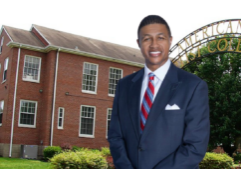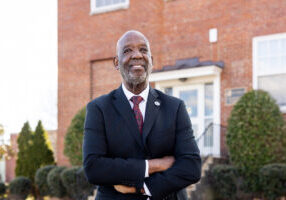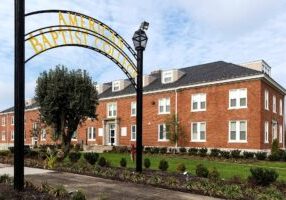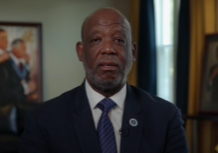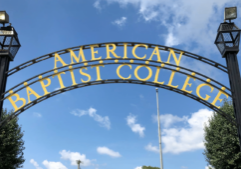Reflections from President Forrest Harris
March 8, 2023
The infamous day, Bloody Sunday, is etched in the power of memory of those who marched across the Edmund Pettus Bridge in Selma, Alabama, for voting rights on March 7, 1965. The late U.S. Congressman, Representative John R. Lewis, a beloved American Baptist College alum, led the march along with the Reverend Hosea Williams. Because of the vicious assault and brutal beatings the protest marchers endured at the hands of Alabama law enforcement, the blood-soaked streets of Selma are a testament of history of the sacrifices made to win voting rights for African Americans. Remembering the sacrifices of those marchers provides inspiration for us to continue seeking justice, equity, and equality in all areas of American society. The article below by the Reverend Marvin McMickle does an excellent job of tracing Bloody Sunday to the passage of the 1965 Voting Rights Act. American Baptist College celebrates the symbolic history of Bloody Sunday standing against laws to suppress voting rights today. We call for no further delay in the passage of The John Lewis Voting Rights Act. We will continue the pursuit of justice.
“We who believe in freedom cannot rest until it comes.”
Quote from a song composed by Dr. Bernice Johnson Reagon, using the words spoken by civil rights activist Ella Baker
In Shadow of ‘Bloody Sunday’, the Fight for Voting Rights Continues
Marvin A. McMickle, Ph.D.
Bloody Sunday was only Act One of a three-act drama. In response to the murder of Jimmie Lee Jackson one month earlier by Alabama State Police following a voter registration protest, 600 people gathered on March 7, 1965, in Selma, Alabama to begin the 54-mile march to the state Capitol in Montgomery to demand voting rights for African Americans. The march would officially begin once people had crossed over the Edmund Pettus Bridge that stretched over the Alabama River.
When the marchers got to the bridge’s midway point they could see a line of Alabama State Patrol officers, many of them on horseback, blocking the road ahead. The marchers, led by John Lewis and Hosea Williams were told to disperse and return to their homes or churches. When the marchers refused that order, the State Patrol officers advanced and began to assault them with billy clubs, tear gas, electric cattle prods, bull whips, and clubs covered with strips of barbed wire.
The carnage resulting from that assault by white law enforcement officers against peaceful, law-abiding marchers resulted in the term “Bloody Sunday”. One notable casualty of that day was a local woman from Selma named Amelia Boynton who was beaten until she was unconscious.
That March did not continue on March 7. However, that was only the opening act of a longer running drama. The decision was made that a March to Montgomery had to be resumed as soon as possible. Dr. Martin Luther King, Jr. sent out a call for clergy leaders of all faith traditions to join him for a March that would occur two days later, on March 9. This time the police and state patrol opened ranks, presumably to allow the marchers to pass through.
But King instructed the marchers to return to Selma for two reasons. First, they had not received a permit for the march from federal judge Frank Johnson. That meant the march would not receive any protection from federal troops during their multi-day walk through the Alabama countryside.
The second reason King decided against proceeding with the march was his concern that the police would close ranks behind them once the marchers had passed through. That would leave them defenseless and unable to retreat if and when they were to be attacked further down the highway. In the military, that would be “a killing field”.
Despite much disappointment from members of the Student Non-Violent Coordinating Committee (SNCC), the second march was called off.
On March 15th President Lyndon Johnson made a dramatic, nationwide television speech calling for a national voting rights bill. In that speech, Johnson invoked the words of the Civil Rights theme song, “We Shall Overcome “.
The third act took place on March 21. By that time, a federal court permit to march had been issued. President Johnson federalized the Alabama National Guard and assigned 1900 soldiers and federal marshals to accompany the marchers all the way from Selma to Montgomery on a five-day March on a road known as Jefferson Davis Highway.
On March 25, more than 25,000 marchers arrived at the Alabama State Capitol to dramatize the call for voting rights in that state. As a direct response of these three dramatic actions, during which two white marchers, Viola Liuzzo and James Reeb were murdered, the 1965 Voting Rights Act was signed into law on August 6, 1965.
Today, those hard-won voting rights are in danger of being stripped away, first by the conservative justices of the United States Supreme Court, including Clarence Thomas. There are also state legislatures across this country that are implementing voting restrictions of one kind or another.
There is a bill languishing in the United States Congress entitled The John Lewis Voting Rights Advancement Act. Who would have believed that 58-years after the three-act drama of Bloody Sunday that there would still be a need to fight for the fundamental right of African Americans to vote in the United States of America?
In 2023, it is required of all of us to show the same courage and resolve as those who marched across the Edmund Pettus Bridge to gain voting rights for all qualified citizens.
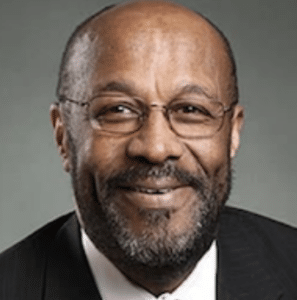 The Rev. Dr. Marvin A. McMickle, pastor emeritus of Antioch Baptist Church in Cleveland, Ohio, is interim executive minister, Cleveland Baptist Association, American Baptist Churches, USA. He served as president of Colgate Rochester Crozer Divinity School, Rochester, New York, from 2011 to 2019.
The Rev. Dr. Marvin A. McMickle, pastor emeritus of Antioch Baptist Church in Cleveland, Ohio, is interim executive minister, Cleveland Baptist Association, American Baptist Churches, USA. He served as president of Colgate Rochester Crozer Divinity School, Rochester, New York, from 2011 to 2019.


